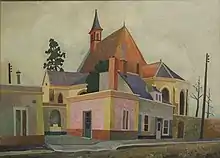%253B_Victoria_Art_Gallery.jpg.webp)
Frank Mundy Coombs (30 July 1906 – 15 April 1941) was an English painter, architect and art dealer.[1]
Early life
Frank Coombs was born in Radstock, the son of Frank and Louisa Isabel Coombs, of Bath, Somerset.[2]
He studied art at King's School, Bruton under Arthur Jenkins.[1]
Career

Frank Coombs qualified as an architect and worked at the Hampshire County Council.[1] For two years, he lived in the island of Sark and there met Ala Story, while Story was on a vacation, and followed her back to London, where Story owned the Storran Gallery.[1]

Coombs was responsible for the progressive turn of the Storran Gallery.[3] Originally selling woodcuts and greeting cards, when Coombs joined the gallery in 1935 he organized his first show, a show that completely changed the future of the business.[1] After that first show, Coombs, together with Eardley Knollys and Ala Story, exhibited works by Pavel Tchelitchew, Ivon Hitchens, Frances Hodgkins, Christopher Wood and Victor Pasmore.[3][4] When Story sold her share to Knollys, Knollys and Coombs started to exhibit works by Pablo Picasso, Amedeo Modigliani, Maurice Utrillo, Glyn Philpot (Philpot painted Coombs' portrait), Claude Monet, Pierre-Auguste Renoir, Paul Gauguin, Maurice de Vlaminck, André Derain and Amedeo Modigliani.[4] Under Coombs' and Knollys' direction, the Storran Gallery became one of the most notable galleries of its time promoting Modernist art.[5][6]
Coombs was part of The London Group.[4] He was among the young artists nicknamed the Cork Street Front, and exhibited with them in 1940 at the Special War-time Show hosted by the New Burlington Galleries.[7]
Coombs and Knollys befriended many clients like Lady Ottoline Morrell, Duncan Grant and Graham Sutherland.[4]
Personal life
World War II and death
At the outbreak of World War II, Coombs joined the Royal Navy (HMS Caroline) and was killed during the Belfast Blitz by enemy action on 15 April 1941. After Coombs's death the bereaved Knollys closed the Storran Gallery in 1944.[4][2]
References
- 1 2 3 4 5 "Mill Hill Folly" (PDF). Retrieved 26 July 2017.
- 1 2 "Frank Coombs (1906–1941)". Retrieved 26 July 2017.
- 1 2 Jane Hill (2011). The Sculpture of Gertrude Hermes. Ashgate Publishing, Ltd. p. 88. ISBN 9780853318651.
- 1 2 3 4 5 6 Farnham Herald. "Life and times of artist in public gaze". Retrieved 26 July 2017.
- ↑ "Eardley Knollys". Retrieved 26 July 2017.
- ↑ Ian Wallace. "10 of Art History's Most Important (and Now Defunct) Galleries". Retrieved 26 July 2017.
- ↑ Thomas MacGreevy (1940). In the World's Art Centres. The Studio. pp. 25–26.
- ↑ "The Radev Collection: Bloomsbury and Beyond" (PDF). Archived from the original (PDF) on 26 November 2011. Retrieved 26 July 2017.